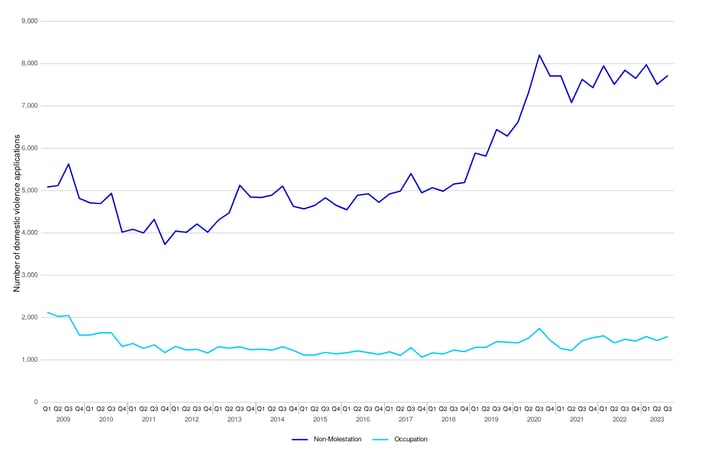CANSFORD LABS
New UK Family Law blog for 2024: The not-so-jolly season for some
on Jan 9, 2024
In his first exclusive article of 2024 for Cansford, Family Law Blogger John Bolch examines the latest statistics regarding domestic abuse, domestic violence remedy orders (DVROs), the police, scammers and what happens next. With so many cases involving drug and alcohol testing between partners, it's a stark read.
It is a well-known and grim fact that the Christmas/New Year holiday sees an upsurge in the incidence of domestic abuse, but I don’t recall ever coming across so many domestic abuse related news stories during the holiday that we have just (hopefully) enjoyed.
And the news was almost universally depressing.
Long-term increase in applications for domestic violence orders
The first story came just before Christmas, with the publication by the Ministry of Justice of the latest statistics for the Family Court, for the quarter July to September 2023.
The statistics included figures for the number of applications for Domestic Violence Remedy Orders (more commonly known as ‘non-molestation’ and ‘occupation’ orders), pictured below.
On the face of it the news was not that bad, showing that the number of such applications actually decreased compared to the equivalent quarter in 2022 (albeit by less than 1%), and that the number of orders made by the courts decreased by 9% over the same period.

However, looking a little more deeply, we are told that: “The overall picture highlights a longer-term increase in the number of applications, with the number of applications in the latest quarter almost double those made since the series [of statistics] began in 2011.”

The Ministry of Justice does not give any suggestion as to quite why there was such an increase over that period. Is the prevalence of domestic abuse getting worse, or is it that more victims are seeking the protection of these orders?
Rise in women facing domestic abuse at Christmas
And then on the 22nd of December The Guardian told us that English charities were reporting a rise in women facing domestic abuse at Christmas.
Plus ça change.
We were informed that: “Rising numbers of women are experiencing domestic abuse at Christmas, with calls to helplines still higher than pre-pandemic levels due to the cost of living crisis.”
The 3rd sector/charity viewpoint
The domestic abuse charity Refuge said that calls and contacts to the national domestic abuse helpline in 2023 were still far higher than pre-pandemic, with 171,490 calls in the year ending March 2023, and warned that that: “Christmas, when there are always more incidents of domestic abuse, presents specific challenges such as social isolation and increased costs that are compounded by the cost of living crisis.”
The only thing that I would add (and this also applies to the last story, below) is that men are also of course victims of domestic abuse. The latest Crime Survey for England and Wales, for example, estimated that 2.1 million people aged 16 years and over experienced domestic abuse in the year ending March 2023, of which 1.4 million were women and 751,000 men.
Domestic abuse survivors targeted by scammers
And even when victims seek help they can find themselves targeted by scammers, as the next story informed us.
The story said that: “Opportunists are targeting victims of domestic abuse by lying about their professional experience and charging them for legal and emotional help.
“Capitalising on the vulnerability of victims and the lack of government-funded support available, they pretend to be qualified counsellors, domestic abuse “consultants” or specialist lawyers, while advertising fees that they claim are lower than standard rates.”
I suppose I shouldn’t be surprised, but this is perhaps the most depressing story of all.
Victims of abuse lose trust in Met police
Moving on, The Guardian also reported that victims of domestic abuse have lost trust in the Metropolitan police, according to a senior officer.
This comes after high-profile scandals involving the former Met officers Wayne Couzens, who raped and murdered Sarah Everard, and David Carrick, who was convicted in January of 85 rapes and assaults, making him one of the worst sexual offenders in modern times.
Detective Superintendent Andrew Wadey, the Met’s lead for domestic abuse and stalking, acknowledged that the force had “let women and girls down badly in the past”, but insisted they were committed to rebuilding trust.
He also said that an additional 550 officers would be placed in public protection roles across the force over the next year, including 180 detectives dedicated to investigating domestic abuse.
For many victims of abuse, particularly involving violence, the police are their first line of protection. It is therefore essential that victims have confidence in their local police force.
Scrapping short jail terms puts women at risk
Finally, it was reported just prior to New Year that Nicole Jacobs, the Domestic Abuse Commissioner, has warned that the government’s policy to reduce the pressures on overcrowded prisons by scrapping short prison sentences will put women at risk, by allowing abusive men to walk free from court.
As drafted, the government’s Sentencing Bill places a duty on judges to impose suspended sentences where they may otherwise have given jail terms of 12 months or less, save where there are exceptional circumstances.
After advocacy groups raised concerns the government did add an exemption to the Bill, where convicted individuals had breached a court order or could be shown to pose a significant risk of causing psychological or physical harm to another person.
However, Jacobs told The Guardian that this did not go far enough, and that there should be a specific exemption for perpetrators of domestic abuse.
I don’t know when the Bill is likely to pass, but it will surely then only be a matter of time before we read the first reports of victims suffering further abuse (or worse) because its provisions meant that their abusers were spared prison.
So what conclusions can we draw from all of this?
The only one that comes to mind is that domestic abuse remains an awful scourge in our society, which can affect anyone at any time. We must redouble our efforts to combat it.
Happy New Year.
Image credit - Pexels: Karolina Grabowska

John Bolch
John Bolch is well-known as one of the UK’s leading family law bloggers. He gave up practising in 2009 and now works freelance as a writer on family law matters.
